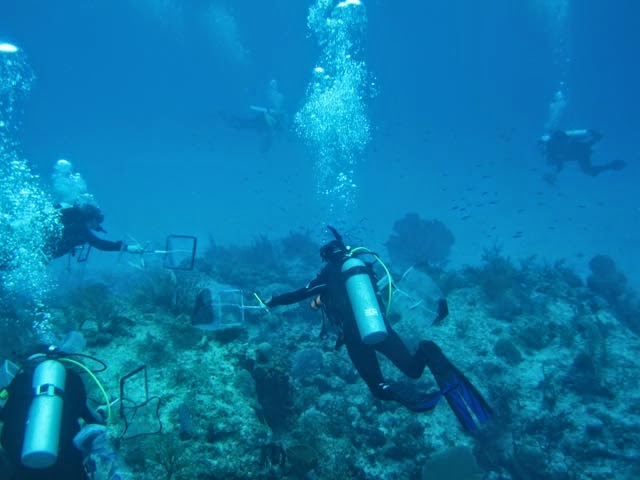This post about a beach seine and copper sweeper roundup comes to us from Austin, who normally cares for the shorebirds on Central Wharf.
On most of our dives we collect in groups of 2 – 5 divers and work together to corral and catch fish in our nets and transfer them into catch bags. Depending on the water depth we either bring them directly to the boat or put them in a barrel with holes in it that hangs from the boat and is raised in the water at increments to allow the fish to decompress.
 |
| On the reef looking for fish |
However we collect the two most fragile species, needle fish and copper sweepers, with different methods where all of the trip staff and participants work together as a team.
 |
| South Cat Key |
On March 25 we went ashore on South Cat Key, a small uninhabited island, to seine for needle fish. We pulled a 100 ft seine net through the shallow waters by the beach and collected needlefish. Needlefish have delicate scales so we very carefully removed them from the net and transferred them to coolers to be brought back to the tanks on the boat.
 |
| Before wading into the water, Don and Barbara show the team how to gently seine with the help of a paper towel. |
 |
| Success: Needlefish collected in seine |
You can see needlefish swimming near the surface of the Giant Ocean Tank. Their silvery blue coloration makes them almost invisible when seen from above or below.
On March 27 we dove together as a team to collect copper sweepers. These cute fish live in large schools under ledges and in caves in the reef. You can see them at the Aquarium in the Blue Hole exhibit alongside our goliath groupers. Like the needlefish, copper sweepers are delicate and need to be collected with care. The collection of the copper sweepers was highly coordinated and involved all of the collectors working together.
 |
| Copper sweeps in their protective bag |
Once caught, the copper sweepers are transferred into large plastic bags which are smooth and protective, while still allowing the fish to school. It was my job to hold one of the bags and make sure that the fish were transferred gently.
Participating in the needlefish and copper sweeper roundups was some of the most fun I had on the trip and I was impressed with how well coordinated and successful these roundups were.



0 comments:
Post a Comment